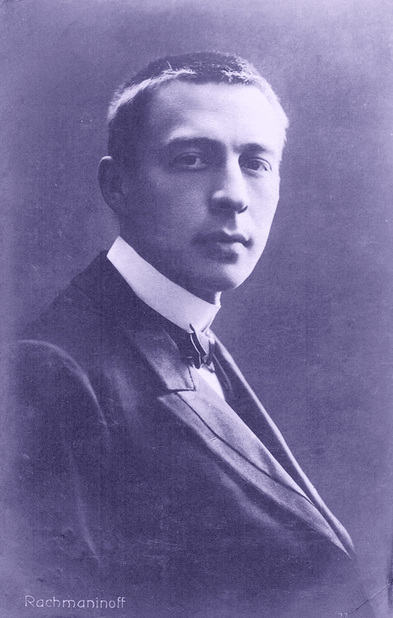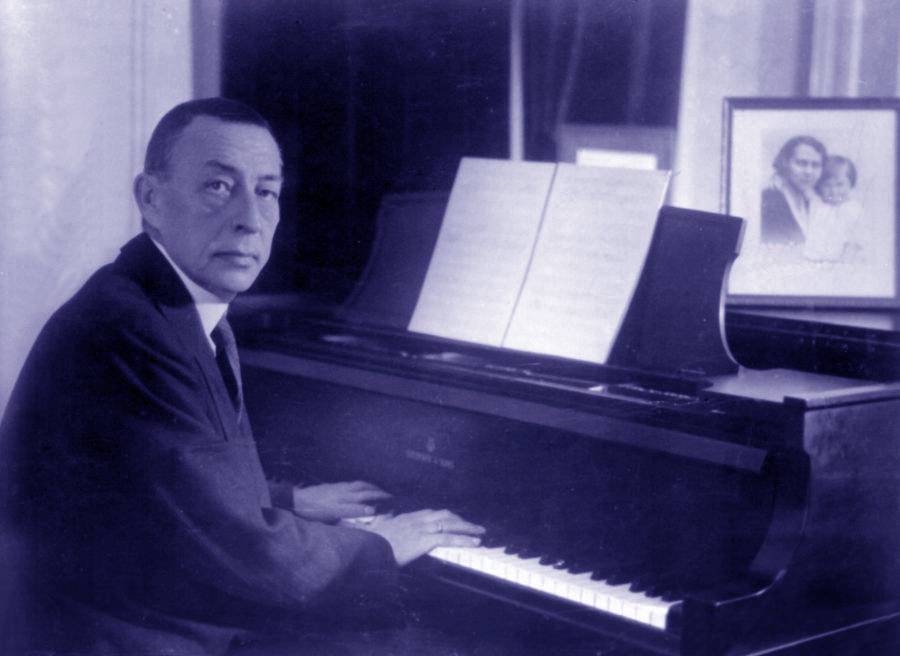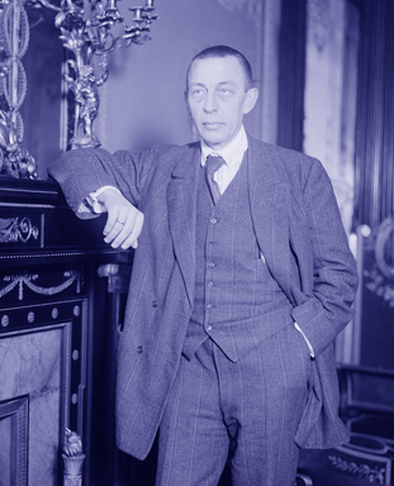Sergei Rachmaninov (1873-1943) Arguably Russia’s leading composer following the death of Tchaikovsky in 1893, Rachmaninov was born in Oneg, near Novgorod, northwest of Moscow, on April 1st 1873 (March 20th OS). He grew to prominence as a pianist of formidable gifts, his debut piece being his famous Prelude No.1 in C sharp minor in 1892. It was at a rehearsal the next year for his opera Aleko, taken from Pushkin’s The Gypsies, that Tchaikovsky was observed congratulating the young composer, unofficially passing on his baton so to speak.
His meteoric rise was stalled however in 1897 at the first performance of his Symphony No.1 in D minor op.13. Rachmaninov had put heart and soul into this brilliant and ground-breaking score in which all the melodies are metamorphoses of motifs and themes taken from Russian Orthodox Chant. It also commemorated a failed love affair and at the head of the score, he quotes Tolstoy’s Anna Karenina “Vengeance is Mine, I shall repay.” For reasons best known to himself, the conductor, fellow composer Alexander Glazunov was apparently drunk in charge of the podium. The performance was a disaster. Rachmaninov was apparently so distressed that he left before the end of the concert and, legend has it, threw the original manuscript full score into the River Neva. The truth is less spectacular. He kept the original score at his wife's family estate at Ivanovka and for many years intended to revise it, but when he and his family left Russia, the score was unfortunately left behind and has not been seen since. There were, of course no further performances in Rachmaninov’s lifetime. He eventually told his daughters that he would forbid performances of it in his will. Thankfully however this did not happen. In 1945 the original orchestral parts were discovered in Leningrad, a full score reconstructed and the Symphony No.1 received its triumphant second performance. Sadly Rachmaninov did not live to see his greatest triumph, as he had died in 1943. Following the failure of the Symphony No.1 he wrote almost nothing for two years. Finally his worried family persuaded him to seek the services of a hypnotherapist. Dr Nicolai Dahl’s treatment was so successful that Rachmaninov dedicated the piece that resulted from it to him. This was the Piano Concerto No.2 in C minor op.18, arguably his most famous work and one known to most of us through its poignant use in the 1945 film “Brief Encounter”. After this, Rachmaninov could do no wrong, at least in Russia. Not only was he successful as a pianist, his symphonic works won prizes. The Piano Concerto No.2 won the Glinka Prize in 1904 and the Symphony No.2 in E minor op.27 won the same prize in 1908. He was also feted as a conductor, most successfully at the Private Opera in Moscow where he met the famous Bass Feodor Chaliapin, who became a life-long friend. He was also moving in much higher circles too, as many great pianists and composers before him have done. Beethoven, in particular rubbed shoulders with the highest in the land in both Royal and intellectual circles in his day. Rachmaninov was no different. He was good friends with Tsar Nicholas II’s brother Grand Duke Michael and Alexander Rachmaninov, the composer’s grandson treasures a photograph of his grandfather sharing an intimate tea with Nicholas II himself. The Imperial family is known to have loved his compositions. Up to the time of the Revolution, Rachmaninov was wealthy, well-known and highly successful. But at the time of the Bolshevik uprising, things became very difficult for him. Indeed, his closeness to Tsar Nicholas and his family could have been a death sentence for him and his family had he not been given a lifeline by the Swedish Royal Family in the form of a concert invitation to perform specially for them in Stockholm. At great risk, he and his family left on a train for Sweden with only the clothes they stood up in. They were alive, but they were destitute and at the age of 44 Rachmaninov had to begin his life all over again from nothing. He was later to refer to Stalin and the Bolsheviks in an open letter to the New York Times in 1931 as: “Nothing but a group of professional murderers.” Utilising his enormous prestige as a pianist, Rachmaninov began the second part of his life as a traveling virtuoso playing popular mixes of his own and other people’s compositions. He eventually did the smart thing and moved to the USA where he was paid handsomely for his work. But he was always on the road and this, combined with a great feeling of disillusionment at the direction of early 20th century music in the wake of the innovations of Schoenberg and the Second Vienna School, added to profound spiritual homesickness meant that between 1917 and 1927 he composed nothing at all. Indeed in the final 26 years of his life he composed only six numbered works, the first being the original version of the Piano Concerto No.4 in G minor op.40 in 1927 and the last being the Symphonic Dances op.45 in 1940; this should be compared to 39 completed opus numbers in the previous 25 years between 1892 and 1917. His constant concertizing meant that he was able to keep his family in the manner to which they had become accustomed, but it also had a grave effect on his health. He gave his last concert, with his fingers bleeding, at Knoxville Tennessee on February 16th 1943 just a few weeks before he passed away from inoperable lung cancer caused by years of stress and chain-smoking. Rachmaninov said towards the end of his life that his compositions were inspired by the thought of “what might have been”, clearly a reference to the vanished world of Imperial Russia and the Silver Age of Nicholas II, of which he had been so integral a part. This must give us pause especially today. For if Rachmaninov’s work is about what might have been, might it not also be about “what might yet be?” Something for us all to think about in an age that is crying out for beauty. And one final thought. Rachmaninov’s music always feels to me as if it is the living embodiment of the following quote from Dostoyevsky, one with which the composer, I’m sure would have agreed: “Beauty will save the world” |
Imperial Russian Ballet | NEXT PAGE |
All website content copyright © Steven Ingman-Greer. All rights reserved.



